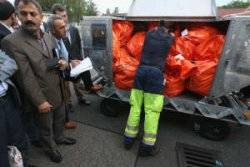Turks are preparing to head to the polls on Sunday to elect a new president in a vote in which Prime Minister Recep Tayyip Erdogan is the front running candidate.
For the first time in Turkey's history, the president will be elected by a popular vote, in line with a constitutional amendment adopted in 2007.
Erdogan is looking to extend his more than 10 years in power in the culturally divided nation, with his main opponent Ekmeleddin Ihsanoglu, a conservative academic and diplomat who used to lead the Organization of Islamic Cooperation, hoping to score a surprise victory.
Ihsanoglu is supported by the left-leaning secularist Republican People's Party (CHP) and Nationalist Movement Party (MHP), the two largest opposition parties in the country, in addition to three smaller ones.
However, Ihsanoglu is a largely unknown figure among the Turkish public.
Selahattin Demirtas, a senior figure among Turkey's Kurdish minority, is the third presidential candidate. He is supported by the People's Democracy Party (HDP), a pro-minority rights party supported primarily by Kurdish Turks.
A survey conducted by Turkish pollster A&G put Erdogan on 55.1 percent, with Ihsanoglu predicted to gain 33 percent and Selahattin Demirtas on 11.6 percent of the votes.
AK Party local victories
The presidential vote takes place just three months after Erdogan's ruling conservative Justice and Development Party's (AK Party) scored a landslide win in local elections.
The local elections were held in a tense political climate amid new internet controls, frequent anti-government protests and allegations of corruption surrounding Erdogan's government.
However, the prime minister's popularity seems unscathed by the developments and he has made little secret of his desire to see the largely ceremonial role imbued with far greater clout if he wins.
During his campaign, Erdogan has talked about infrastructure projects, foreign policy actions, economic reforms, and a new constitution featuring a presidential system, promising a more active presidency, a position which is highly symbolic in Turkish politics.
Conversely, Ihsanoglu has stressed "unity" and "neutrality", drawing a more traditional and passive picture for his potential presidency.
Since founding the AK Party in 2001, Erdogan has overseen unprecedented growth and stability after a long period of economic chaos and political drift.
However, secular opponents see him as an authoritarian and highly conservative leader, who can tighten his grip on the country if he takes the seat as president.
Unless a candidate receives more than 50 percent support in the first round, a run-off vote will be held on August 24 between the top two candidates.
PHOTO CAPTION
A worker loads bags of ballots cast by expatriate Turks living in Hanover from a truck onto an aircraft cargo container for shipping to Turkey as Turkish elections commission members look on at Tegel Airport on August 5, 2014 in Berlin, Germany.
Aljazeera


 Home
Home Discover Islam
Discover Islam Quran Recitations
Quran Recitations Lectures
Lectures
 Fatwa
Fatwa Articles
Articles Fiqh
Fiqh E-Books
E-Books Boys & Girls
Boys & Girls  Ramadan
Ramadan Fatwa Audios
Fatwa Audios Month of Mercy
Month of Mercy Women
Women Eed Al- Fitr
Eed Al- Fitr Food Recipes
Food Recipes Videos
Videos

 Prayer Times
Prayer Times












